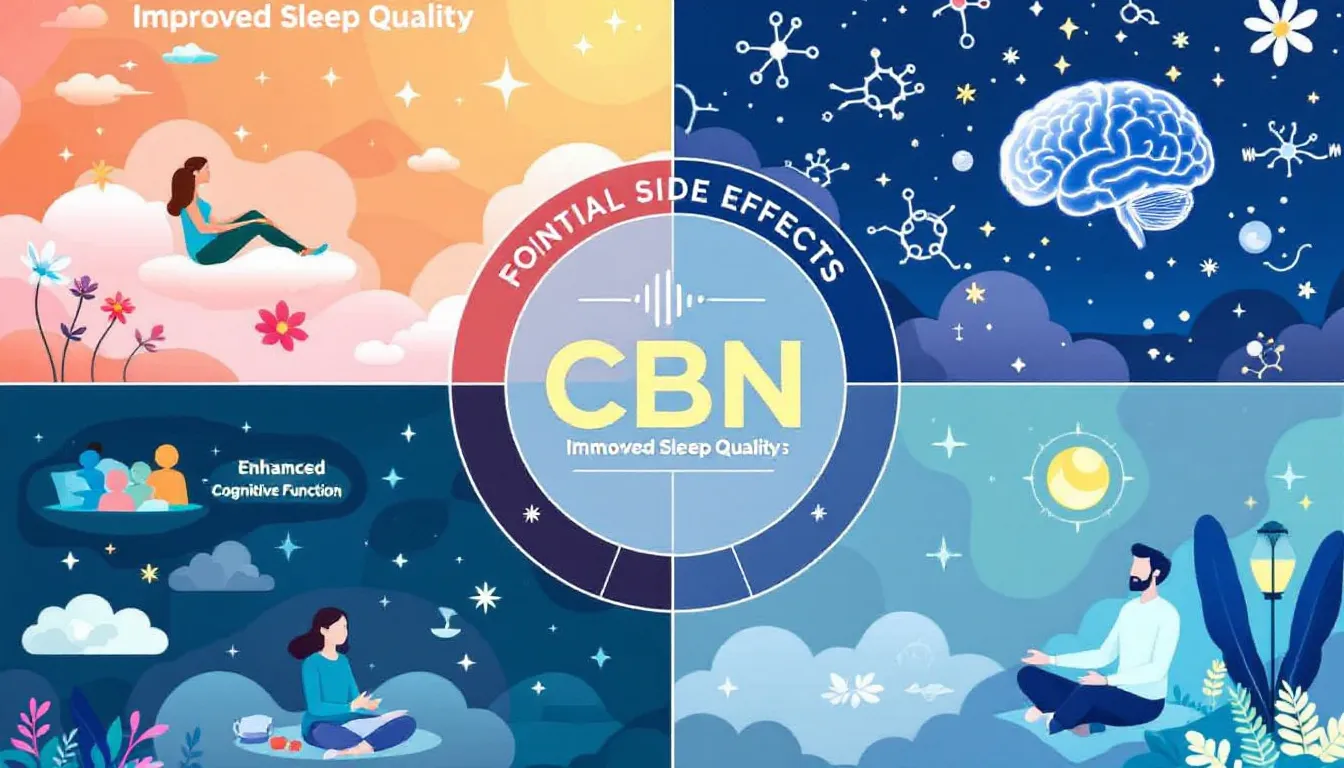CBN, or cannabinol, is a cannabinoid formed as THC ages. It’s less potent than THC and has unique effects. Learn what is CBN, its benefits, and its uses in this article.
Key Takeaways
- CBN, a minor cannabinoid derived from the degradation of THC, has unique properties that differentiate it from major cannabinoids like CBD and THC, making it a promising area for therapeutic research.
- Research suggests that CBN may aid in promoting sleep quality, managing pain, and stimulating appetite, although further studies are needed to confirm these benefits.
- When considering CBN products, it is essential to select reputable brands that prioritize safety, transparency, and third-party testing to ensure quality and mitigate potential risks.
Understanding CBN

CBN, or cannabinol, is a cannabinoid that originates from the degradation of THC over time when exposed to heat, light, or oxygen. Unlike its more famous counterparts, CBD and THC, CBN is classified as a minor cannabinoid, found in significantly lower concentrations in cannabis plants. As cannabis ages, THC breaks down and forms CBN, which is why older cannabis tends to have higher levels of this compound. Despite its similar chemical structure to THC, CBN is much less potent, with about 25% of THC’s strength. This results in different psychoactive properties and effects on the body, making CBN a unique player in the cannabinoid family.
The current state of research on CBN is still in its infancy, contributing to its lesser-known status compared to CBD and THC. While CBD and THC have been extensively studied, the full range of CBN’s benefits and effects remains a relatively uncharted territory. This lack of comprehensive research may make some hesitate to try CBN, but it also means that we are on the brink of discovering potentially groundbreaking therapeutic applications for this cannabinoid.
As we continue to explore the world of CBN, it’s important to understand how it works within our bodies and what makes it different from other cannabinoids. Its unique properties and potential benefits make it an exciting area of study and use.
How CBN Works
Cannabinol (CBN) interacts with the endocannabinoid system (ECS), which plays a crucial role in regulating various physiological processes, including sleep and circadian rhythms. The ECS includes receptors such as the CB1 receptor, where CBN exhibits agonist properties, although it is less potent than THC. This interaction is thought to contribute to CBN’s ability to promote sleep without causing significant intoxication effects.
Some manufacturers claim that CBN can induce drowsiness and enhance sleep quality, especially when combined with other sleep aids like melatonin. Research suggests that CBN may provide various health advantages, particularly in promoting sleep. As we learn more about how CBN works, its potential as a therapeutic agent becomes increasingly apparent.
Benefits of CBN

CBN has been gaining attention for its potential therapeutic benefits, especially in promoting sleep and managing pain. These benefits are explored in more detail in the following subsections, highlighting how CBN can be a valuable addition to your wellness routine.
Promoting Sleep
One of the most promising benefits of CBN is its potential to promote sleep. In clinical settings, CBN administration has shown potential for improving sleep quality and reducing wake after sleep onset in patients with insomnia. Preclinical studies indicate that CBN may enhance non-rapid eye movement (NREM) sleep duration and overall sleep bout length. These findings suggest that CBN could be a valuable tool in managing sleep disorders, particularly chronic insomnia and other sleep problems.
The pharmacological effects of CBN on sleep are thought to be mediated through its interaction with brain cannabinoid receptors, influencing various sleep parameters. Unlike THC, which can produce a strong euphoric effect, CBN is known for its calming, sedative qualities, making it more suitable for promoting restful sleep. This could be particularly beneficial for individuals who have trouble falling asleep, staying asleep, or experience early waking and daytime sleepiness.
With the growing demand for effective sleep solutions, CBN is marketed as a sleep aid, featuring in various products designed to assist those facing sleep challenges. These products, often included in dietary supplements, aim to promote overall wellness and enhance sleep quality.
While more research is necessary to confirm its efficacy, CBN is gaining attention as a strong sedative and potential solution for those with clinical sleep medicine, insomnia symptoms, and other sleep disorders.
Pain Relief
CBN also possesses analgesic properties, making it a potential aid in pain management. Evidence suggests that CBN could be particularly beneficial for individuals managing chronic pain, providing an alternative to traditional prescription drugs. This can be especially important for those suffering from conditions like arthritis and fibromyalgia, where CBN’s pain-relieving properties may offer significant relief.
Integrating CBN into pain management strategies could provide a new avenue for chronic pain patients, helping them achieve more restful sleep and improve their overall quality of life. As with its sleep-promoting benefits, more research is needed to fully understand and confirm the analgesic effects of CBN.
Appetite Stimulation
Unlike CBD, CBN is known to stimulate appetite, which can be particularly beneficial for individuals with reduced appetite due to illness. This appetite-stimulating effect can help improve nutritional intake, which is crucial for maintaining overall health and wellness. For those undergoing medical treatments that reduce appetite, CBN could play a vital role in enhancing their quality of life by helping them regain a healthier appetite.
By improving appetite, CBN can support better nutritional intake and overall well-being, making it a valuable component in dietary supplements aimed at promoting health and wellness. As research continues, the full scope of CBN’s benefits in appetite stimulation will become clearer.
Uses of CBN

CBN is increasingly being recognized as a potential sleep aid, with various products incorporating this cannabinoid to enhance sleep quality. These products range from tinctures and capsules to gummies, each designed to harness the benefits of CBN for better sleep and overall wellness.
Sleep Aid Products
CBN’s sedative qualities make it a promising ingredient in products aimed at alleviating insomnia symptoms and promoting better sleep hygiene. These sleep medicine products, often available as tinctures, capsules, and gummies, are formulated to help individuals fall asleep and stay asleep more effectively.
Selecting CBN products that undergo third-party testing is essential for ensuring safety and potency. Reputable brands should provide lab testing results that are readily accessible to consumers, reflecting their commitment to product quality.
Opting for products with organic ingredients can improve quality and minimize exposure to harmful pesticides.
Topical Applications
Topical formulations containing CBN are used for localized relief of pain and inflammation. These products, such as creams and balms, are designed to provide targeted relief, making them ideal for addressing specific areas of discomfort.
CBN’s potential effectiveness in topical applications is being explored in clinical trials, with some studies indicating that it may provide localized pain relief and reduce inflammation. Continued research may establish CBN in topical formulations as a valuable option for those seeking localized pain relief.
Dietary Supplements
CBN is also available in various forms like oils and capsules, often included in dietary supplements for overall wellness benefits. These supplements aim to promote health and wellness by leveraging the potential therapeutic properties of CBN.
Research is ongoing to determine the specific benefits of CBN when used in dietary supplements. As findings emerge, CBN could become a key ingredient in complementary and integrative health practices, supporting a holistic approach to well-being.
Potential Side Effects and Risks

While CBN shows promise, limited studies exist on its safety, making its side effects largely unknown. This uncertainty underscores the importance of caution when using CBN products, as unregulated products may contain harmful contaminants.
CBN may exhibit side effects similar to THC, such as increased heart rate and potential mental health conditions deterioration, though it is primarily non-psychoactive. Higher doses of CBN, however, may lead to mild psychoactive reactions, which is why it’s crucial to monitor dosage carefully.
Consulting healthcare professionals before starting CBN is advisable, particularly for pregnant or breastfeeding individuals, or those with a history of substance misuse. This precaution helps mitigate the higher risk of adverse effects and ensures safe use.
Comparing CBN with Other Cannabinoids
CBN presents unique properties when compared to other cannabinoids, such as CBD and THC, offering different therapeutic benefits and psychoactive effects. This comparison helps highlight CBN’s potential and differentiates it from its more well-known counterparts.
CBN vs. CBD
While CBD is widely recognized for its ability to relieve anxiety and chronic pain, CBN is gaining attention for its potential sleep-inducing properties. CBD is typically non-psychoactive, providing therapeutic benefits without a high, whereas high doses of CBN can lead to mild psychoactive effects.
The distinct properties make CBN suitable for those needing sedation and sleep support, whereas CBD is preferred for managing anxiety and pain without psychoactive effects.
CBN vs. THC
The psychoactive effects of CBN are significantly lower than those of THC, making it a safer alternative for individuals seeking non-intoxicating options. CBN interacts with the brain’s CB1 receptor but is less effective at binding to it compared to THC, leading to fewer mind-altering effects.
This makes CBN about 25% as potent as THC, offering relief without intense psychoactive effects.
Legal Status of CBN
The legal status of CBN varies by region. In South Carolina, legislation regulates the sale and distribution of hemp-derived cannabinoids like CBN. Retailers in this state are required to keep these products behind counters to prevent access by individuals under twenty-one, reflecting a cautious approach to their distribution.
Additionally, medical marijuana laws in South Carolina impose specific guidelines on the sale and use of cannabis-based products, ensuring they are available only to qualifying patients through licensed dispensaries. a five percent sales tax is imposed on retail sales of products containing hemp-derived cannabinoids in South Carolina, further indicating the state’s regulatory stance on these compounds. It’s also illegal for individuals under twenty-one to purchase or possess products containing hemp-derived cannabinoids, ensuring that these substances are controlled and monitored.
How to Choose Quality CBN Products

When selecting CBN products, it’s crucial to choose reputable brands that prioritize research and efficacy. Manufacturers of hemp-derived cannabinoid products are required to test for cannabinoids, heavy metals, and other contaminants to ensure safety and quality. This includes adhering to regulations that impose strict labeling requirements, informing consumers about potential risks. Medical cannabis dispensaries also follow these stringent standards, ensuring their products are carefully tested for safety and potency
Transparency in ingredient sourcing is crucial. Reputable brands disclose product contents, helping avoid harmful substances and ensuring safety standards are met, as well as addressing potential risk factors.
In South Carolina, obtaining hemp-derived cannabinoid products through licensed producers and retailers adds an extra layer of consumer protection.
Summary
In summary, CBN is an intriguing cannabinoid that offers unique benefits, particularly in promoting sleep, managing pain, and stimulating appetite. Its interaction with the endocannabinoid system and its distinct properties set it apart from other cannabinoids like CBD and THC. While more research is needed to fully understand its potential, the current findings are promising.
As you consider incorporating CBN into your wellness routine, it’s essential to choose quality products from reputable brands, be aware of its legal status in your area, and consult healthcare professionals if you have any concerns. With these insights, you can make informed decisions and potentially enhance your health and well-being with the benefits of CBN.
FAQ
Can CBN help with chronic pain relief?
Yes, CBN has shown potential in providing relief from chronic pain. Its analgesic properties make it an alternative for individuals managing conditions like arthritis, fibromyalgia, and other chronic diseases. If you’re considering CBN for pain relief, it may complement your medical marijuana treatment. If you’re interested in exploring medical marijuana options for chronic disease or pain, obtaining a medical marijuana card in Jackson could be a step in accessing these therapies.
Is CBN legal to use?
The legal status of CBN varies depending on the region. In places like Mississippi, CBN products are regulated similarly to other hemp-derived cannabinoids. Retailers must adhere to specific rules regarding age restrictions and sales taxes. If you’re looking for medical marijuana in Mississippi, it’s essential to check the state’s regulations to ensure the legality of CBN products and medical marijuana in your area.
Can CBN stimulate appetite?
Yes, CBN has appetite-stimulating properties. This can be particularly beneficial for individuals suffering from reduced appetite due to illness or treatments like chemotherapy. If you're managing appetite loss due to chronic conditions, medical marijuana for chronic disease/pain could also help stimulate your appetite. Consider obtaining a medical marijuana card near me to explore additional treatment options.
What are the most common forms of CBN products?
CBN is available in various forms, including tinctures, capsules, gummies, and topical creams. These forms are designed to deliver the therapeutic benefits of CBN. If you're in Jackson or nearby areas, you can find CBN-infused products alongside medical marijuana options. Obtaining a medical marijuana card in Jackson may help you access a wider range of therapeutic products.
How should I choose a quality CBN product?
When selecting a quality CBN product, choose reputable brands that offer third-party testing and transparency in ingredient sourcing. Ensure the product is free from contaminants and has accurate cannabinoid content. If using medical cannabis for autoimmune diseases, it’s important to research local dispensaries and consult healthcare professionals to find the best product for your needs. In Mississippi, visiting medical cannabis dispensaries can help you find quality CBN options. Understanding the medical cannabis role in the management of autoimmune diseases will guide your selection.






